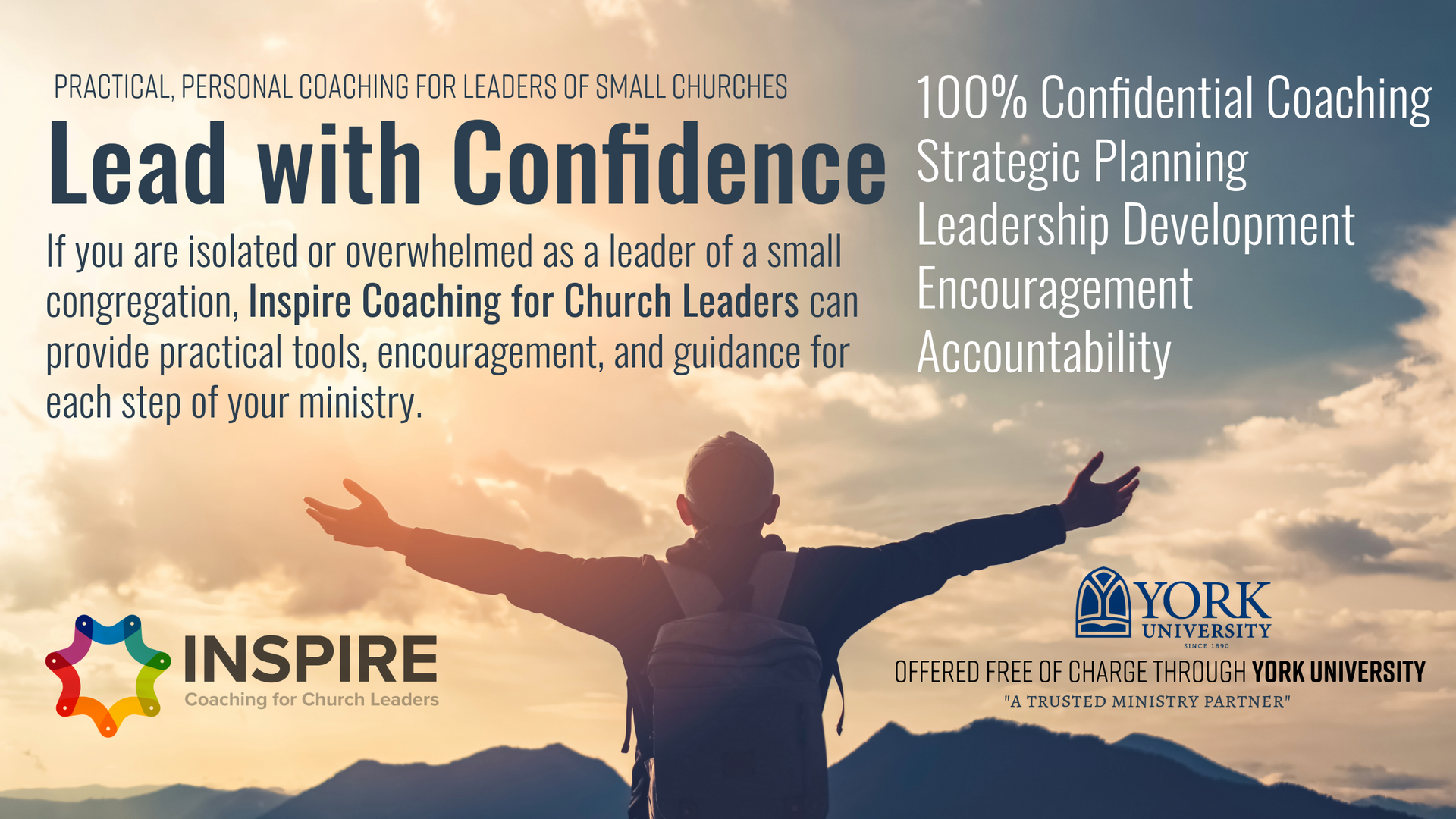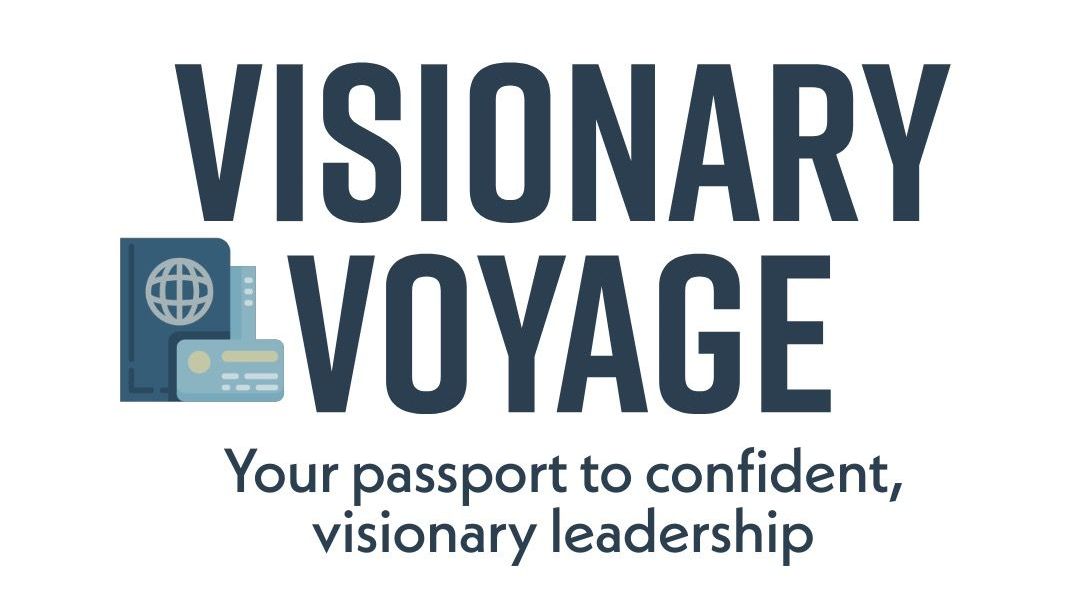For Admitted Program Participants

The Mission of the Rural Church Initiative Coaching Program
Inspire is an executive coaching program designed especially for leaders of small churches. Its mission is to empower rural church leaders through the discovery of compelling ministry vision and the practical tools needed for sustainable impact in the community
Program Overview
The Inspire coaching program helps church leaders articulate a clear mission aligned with their church’s values and community needs. By setting goals through the INSPIRE ACTION framework, leaders can prioritize initiatives supporting the church's mission. Inspire also aids church leaders in developing strategic plans with clear objectives, action steps, timelines, and performance metrics to ensure accountability.
The coaching process enhances leadership skills, emotional intelligence, communication, and conflict resolution, empowering leaders to effectively guide their congregations. It fosters high-performing teams, navigates organizational changes, and addresses interpersonal conflicts. Coaching also helps leaders develop community outreach strategies, build partnerships, and prioritize self-care to prevent burnout.
By offering ongoing professional development, Inspire equips church leaders to stay current on best practices, enhancing their effectiveness and impact. Leveraging MGR Development's expertise in executive coaching and ministry, this program offers a unique opportunity to strengthen their professional skills while growing spiritually.
Are you interested? Want to learn more?
What Others are Saying About your Coach
I consider Rick's coaching to be one of the best investments I've made in my career. When I knew I would be transitioning jobs, I reached out to Rick to guide me through what I anticipated would be a unique and challenging time in my professional journey. Rick made it clear from the start that his role was to help me uncover and refine my own ideas, and he excelled at helping me identify the key questions I needed to ask. His storytelling, along with his skill in balancing analogies and practical advice, made his coaching both accessible and impactful. I highly recommend Rick's coaching to leaders at any level, especially those like myself, who may have been uncertain about the value of coaching—it's definitely worth exploring.
D.J. Iverson
Lead Pastor
Lighthouse Christian Church - Oceanside CA
Learn More
About the Assessment
The Working Genius Assessment is a practical tool designed to help individuals identify their innate abilities and preferences in work and team dynamics. Developed by Patrick Lencioni, the model categorizes six “types of working genius”—Wonder, Invention, Discernment, Galvanizing, Enablement, and Tenacity—into three pairs of areas: gifts, competencies, and frustrations. By clarifying which areas naturally energize us, the assessment provides insight into how we best contribute and thrive in collaborative environments.
From a faith perspective, the Working Genius framework highlights the unique ways God has gifted each person to participate in His work. It helps each person discover their strengths for the building up the body of Christ (1 Corinthians 12:12-27).
Understanding our God-given talents not only brings greater self-awareness but also fosters appreciation for the diverse contributions of others, empowering us to work together more effectively for God’s glory.
The assessment takes about 10-15 minutes to complete.
About Coaching
What is executive coaching and how will it benefit church leaders?
Executive coaching is a professional development process where a coach works one-on-one with a leader or executive to enhance their leadership skills, performance, and overall effectiveness. This personalized coaching typically involves identifying the client’s strengths and areas for improvement, setting specific goals, and developing actionable strategies to achieve those goals. Through regular sessions, the coach provides feedback, support, and accountability, helping the executive navigate challenges, improve decision-making, and cultivate skills such as emotional intelligence, communication, and strategic thinking. The ultimate aim of executive coaching is to empower leaders to reach their full potential and drive their organizations toward success.
These same standards and methods can be applied to church leaders. Coaching is not advising, rather it is a practice that employs a reframing process using active inquiry to help clients seek answers for themselves. When clients identify a way forward for themselves they internalize and activate the solutions more effectively.
ICF Standards
The International Coaching Federation (ICF) is dedicated to advancing the coaching profession by establishing and maintaining high standards, providing independent certification, and building a worldwide network of trained coaching professionals. The key principles and ethical guidelines of the ICF are encapsulated in their Code of Ethics and Core Values. Here are the main principles:
1. ICF Core Values
Integrity: Coaches must uphold honesty and strong moral principles in all interactions.
Excellence: Continuous improvement and striving for the highest quality in coaching practices.
Collaboration: Promoting a culture of partnership and cooperation within the coaching community.
Respect: Valuing each individual's uniqueness and fostering an inclusive environment.
2. Ethical Standards
Responsibility to Client: This includes explaining the coaching process, maintaining confidentiality, and creating clear agreements on roles and responsibilities. Coaches must also manage conflicts of interest and respect the right of clients to terminate the coaching relationship at any time.
Responsibility to Practice and Performance: Adhering to the ICF Code of Ethics, seeking continuous personal and professional development, and managing any potential conflicts of interest.
Responsibility to Professionalism: Coaches must accurately represent their qualifications and experience, and communicate the value and nature of coaching truthfully.
About Workshops
Inspire workshops aim to evoke a sense of purpose, direction, and strategic thinking while offering a creative and engaging approach to mission clarity and strategic planning for church leaders. Workshops will introduce the foundational elements of the coaching program and allow participants to engage deep subject matter within a community of their peers.
Regional Workshop #1
Discovering Your Divine Edge (1.5 day)
This workshop is designed to help leaders delve deep into their inner selves to discover and discern both the spiritual and practical aspects of their leadership abilities. Participants will be introduced to spiritual disciplines to prepare them to consider what they care about, who they care about, what they're good at, and why it matters. They will be introduced to thinkers such as Richard Rhor (Falling Upward) and Patrick Lencioni (The 6 Types of Working Genius). They will also engage in an exercise inspired by the work of Robert B. Cialdini to help them consider how to use their influence with integrity.
Regional Workshop #2
Strategic Vision Quest (1.5 day)
This workshop is designed to inspire visionary thinking about the small local church. Participants will engage in disciplined yet creative ideation exercises and will learn simple discernment practices to consider their emerging visions at a spiritual level. Each participant will leave the workshop with a written vision statement and will develop ways to share the vision with others.
Regional Workshop #3
Church Action Lab (2.5 day)
This lab will build upon the previous workshop and will inspire strategic thinking about the vision. Participants will engage in exercises that help them discern the external opportunities for ministry in their communities as well as the threats and will then assess their church’s ability and capacity to address them. Each participant will leave the lab with a written strategic intent statement and an outline for a strategic action plan and timeline based on a simple INSPIRE ACTION model.
Participants will be introduced to concepts and models developed by authors such as Peter Senge (The Fifth Discipline) and Edgar Schein (Organizational Culture and Leadership) whose research uncovered the power and limitations of organizational structures. The workshop will translate this advanced research into meaningful and useful tools.
About Your Coach
Rick Gibson is the founder of MGR Development, a firm that specializes in coaching senior executives on strategy and communication. Rick is a certified executive coach who helps senior executives build sustainable personal and professional lives. He has a 27-year career at Pepperdine University, where he served as Chief Marketing Officer, Vice President for Church Relations, and Senior Vice Chancellor. Before Pepperdine, Rick was Associate Minister for eleven years at the Mission Viejo Church of Christ in South Orange County, California.
Rick has been active in the community, including roles as president of the Rotary Club of Los Angeles and a member of the Board of Governors for the Los Angeles Chamber of Commerce. He currently serves on the Board of the Rotary Club of Los Angeles Foundation and will be its president in 2027-28. Additionally, he is a trustee for Heritage21, a non-profit aiding declining churches.
Endorsements
Having served as a professional successfully working within not-for-profit organizations and for-profit enterprises for over 50 years, it has been my privilege to know and have worked with Rick Gibson in volunteer leadership roles for more than half of those years.
These experiences have included key leadership roles in Rotary International — locally and globally — as well as Founder and Chairman Emeritus of Netzel Grigsby Associates, a Los Angeles based company that provides expert counsel in fundraising, planning, staffing and training.
To every endeavor Rick brings honor, creativity, patience, and skill. In short, he’s a winner as an individual and professional.
Paul Netzel
Founder and Chairman Emeritus of Netzel Grigsby Associates
Chair, Rotary International Foundation 2017-2018
***
Every president or senior executive officer should have a colleague with a deep understanding of what the leader hopes to communicate and how the message can best be delivered and success achieved. I had the privilege of serving as a president/CEO for 19 years and I can scarcely imagine enjoying my work, much less doing it well, without Rick Gibson's presence helping me think through strategy, priorities, mission applications and substance. He never pressed himself on a situation or topic, but it was clear he was always ready to lend a hand and some carefully framed thoughts.
I am glad he plans to serve others as he served me so loyally during my presidency. He was a trusted ally and he has the ability to fill the same role for you. His gifts and skills are deep and wide, earnest and sincere.
Andrew K. Benton
President Emeritus
Pepperdine University
About the Grant
How is it possible to provide this resource at no cost to the congregation or participating minister?
Pepperdine University has received a $7.5 million grant from Lilly Endowment Inc. as part of its Ministry in Rural Areas and Small Towns Initiative. The funding will support Pepperdine’s “Empower and Equip” program, which aims to strengthen leadership and ministries of Churches of Christ in rural areas and small towns across the U.S. The program will offer leadership training, resources, collaboration opportunities, and innovative solutions to enhance rural ministry vitality.
Mike Cope, Director of Ministry Outreach at Pepperdine, will lead the initiative, which also includes establishing ten regional hub partnerships. One of these hubs will be at York University, utilizing the network of heritage universities to provide targeted training and support for local ministry leaders and lay members. This collaboration underscores Pepperdine’s commitment to reinvigorating ministry efforts in these vital communities.
